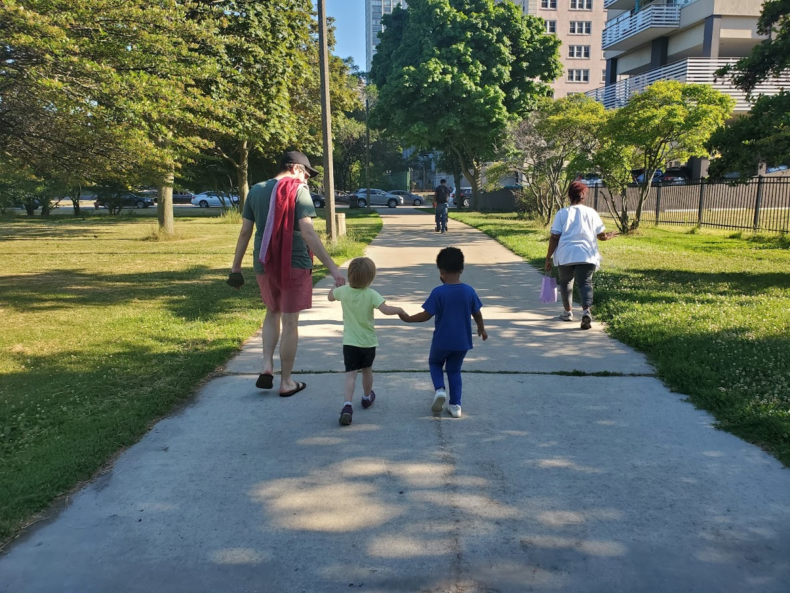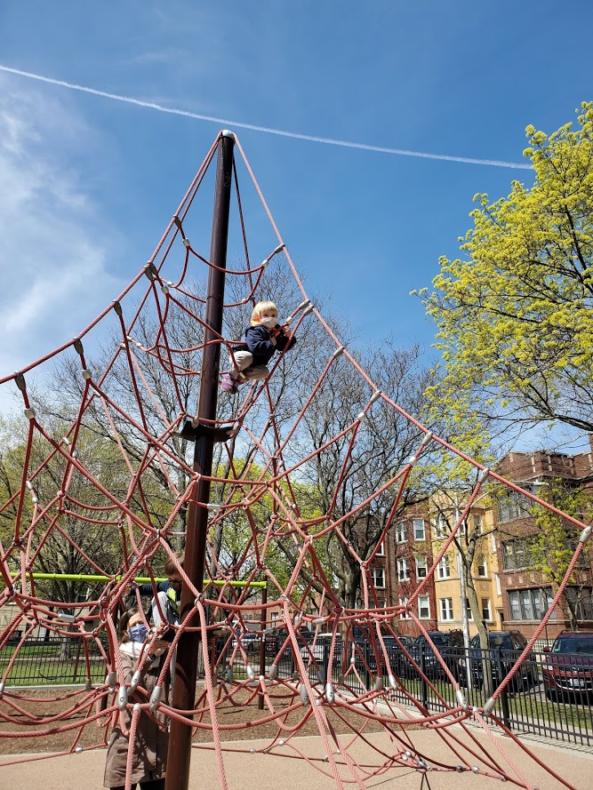
ABSTRACT
What is it about watching kids be kids that is so fascinating? That makes us snap too many photos and text other adults or Tweet at the world in the middle of the day about some random or mundane thing they just did? It might have something to do with the infinite enigma of whatever is happening in their “weird little minds”1. Forget the Sunday crossword.
Put in the words of another dear friend, “All of a sudden they’re just like… doing their own thing, being their own person. You get to see who they are. It’s cool to watch them become.”2
There’s that, too.
METHODS
Sit on a bench halfway out of sight from the child for whom you are responsible*, ideally with a book or another manipulative, to give at least the semblance of preoccupation. You don’t want to be inadvertently influencing behaviors, including giving off signals that you sit at a child’s beck and call. You might not want to engage in small talk with other adults, either. You might, in fact, truly be trying to read the book. Good luck with that.
Observe the children.
*The author does not recommend watching children at a playground without having one or more of them affiliated with you in some manner.
DATA
Instances that struck the author as profound for some reason:

- My kid’s mask falls off and instead of coming to me, he asks another kid to help him. She does. They are little. They get back to the business of playing.
- For several days, we must bring a container of water, formerly a small purple tube that held bubbles, to the splash pads to refill and dump over and over. One day, another kid sees this activity and asks to borrow the purple cylinder. We say sure, and end up leaving without it. Days later, at the same playground, we see the same kid returning. He still has the container. Other kids arrive, and he shares it with them. My child makes no attempt to take it back.
- My kid tries to engage with a small tot, barely walking, not yet talking. Unperturbed, my kid dashes away over and over, prompting them from a structure afar, “Hey! Kid! I’m over here!” the implication being that they, too, should go over there. After enough time, he returns to the tot to check in about why they didn’t comply. Eventually they each go back to doing their own thing.
- Another kid comes up to me and points at my child. “Is that a girl or a boy?” she asks. I reply and she darts away with no further comment. I’ve previously overheard them misgendering each other, but neither has bothered giving a correction. Later, this same girl comes up to me to advocate for my son struggling on the swings, “He needs some help.” I’m not sure he does, but her asking on his behalf makes me smile.
- My kid finds a round scoopy seat on a rod with a small hole, perfect for filling with sticks and woodchips, then spinning like an office chair. He does this by himself for a long while. I look up from an engrossing chapter later, and six other kids are clustered around, squeezing their arms against one another to add their own woodchips to the pile. Slides and swings elsewhere on the playground lie empty, while caregivers look at each other, or their phones, or sit.
- My kid refers to other humans in the wild as “that pink guy” or “that green guy,” determined by the overarching color of their outfits (all of them are “guys”). Slowly, the kids we see at the playground all the time start to inhabit names. Slowly, they stop being “guy” and start being “friend.”
- A slightly bigger kid picks up my kid and puts him on the swing. In thirty seconds, she teaches him how to propel himself, and they sing “in and out” together as they pump their legs for a long, long time thereafter. A few days later, my kid pays it forward to another small kid on a different playground.
- My kid reaches for the monkey bars several times. He can’t quite make it. He looks around and doesn’t see me. Tries again a few times, then moves on to something else. In awe, I realize the secret to not having to carry him along the monkey bars until my arms give out is to stay away. Weeks later, a little bigger, he makes it three rungs before falling to the ground. I can’t resist clapping from my bench on the other side of the turf.
Games that come up frequently and spontaneously across locations and groups of children:
- The Ground is Lava3
- Obstacle Course
- We Must All Go Down the Slide Together in a Dog Pile
- I Found a Stick—Do You Have a Stick? A Rock is Cool Too
- Catch Me
- Can We Use This Equipment Backwards/Headfirst?
- Look How High I Am!
- Can You Get Me Down?
- Mud/Dirt Kitchen
DISCUSSION
While I have many conjectures about what the kids are up to, I suspect I’m way off base. For one thing, when I recently asked my son what he and that red guy were up to, which appeared to be some version of Catch Me remixed with I Found a Stick, he replied, “We’re having a squirrel mystery!”
I’m not bothered by my ignorance, though that doesn’t mean I won’t search for some answers.
Parenting book author Harvey Karp has described the youngest among us as little cavemen, not quite at the same level as the rest of us homo sapiens, yet (Karp & Spencer, 2008). As he writes:
Visit any park and watch the kids “at work.” The five-year-olds act like little “people,” taking turns and using words to settle conflicts, while the one-year-olds act like little “cavemen” (or even chimpanzees), walking clumsily, shoving to go first, and shrieking when upset.4
I’m not sure I would describe the kids on the playground as cavepeople myself, although I understand Karp’s reasoning. Instead, I see them in more of a hippie-dippie light… as reflections of our inner children, maybe.
I’d posit there’s an element of renewal—not to be mistaken for nostalgia—associated with spending time on the playground. What matters to the kids must matter to me, or I’ve lost some core piece tethering me to humanity. Moreover, their concrete way of sense-making, when the total of a social transaction or game can be distilled into simple statements, feels inherently true without being solipsistic. We are having a squirrel mystery.
At the very least, when fatigue outweighs philosophy or interest, most playgrounds have benches where you can take a little break. And once you realize the kids are alright, you might even be able to sit and read a while before dinner. That’s civilized, and a humanities requirement.
REFERENCES
1- Finkbeiner, Ann. “Re: blog – playground observations.” Message to Amy Dusto. 13 June 2021. E-mail.
2- Peyrot, Amy [@AmyPeyrot]. “I think it’s fascinating too! Because all of a sudden they’re just like… doing their own thing, being their own person. You get to see who they are. It’s cool to watch them become.” Twitter, June 9, 2021, https://twitter.com/AmyPeyrot/status/1402676669492596737.
2- Hwang, Tim. On the Architecture of the Folk Game: The Case of ‘The Floor is Lava’ (February 12, 2018). Available at SSRN: https://ssrn.com/abstract=3122458 or http://dx.doi.org/10.2139/ssrn.3122458 (Special thanks to Rachel Sturges for bringing this study to my attention!)
3- Karp, Harvey, and Paula Spencer. The Happiest Toddler On the Block: How to Eliminate Tantrums and Raise a Patient, Respectful and Cooperative One- to Four-year-old. Rev. ed. New York: Bantam Books, 2008. Print.
________
Amy Dusto is a freelance science writer and a speculative fiction author in Chicago. She’s posted before about being a part-time vegetarian and quitting her teaching job. You can find her on Twitter @AmyDusto.
Reviewer Comments:
1) How Delightful!
2) This reviewer suggests a follow-up publication in which the author(s) collect data on a camping trip. Our own anecdotal experience suggests observations may include such things as a five year old carrying a particular stick everywhere (referred to as “my hawk” presumably because it has a small, beak-like projection at one end) and poking it into things so “my hawk can take a look”. And may even include poking said “hawk” into the hollow of a tree and shouting “is anyone home in your hole?!” It is possible that such a quote has been used repeatedly by family members over the past 25 years in a wide variety of circumstances.
Thanks, Amy! Your essay reminds me that so much of play and social interaction is based on experimentation & out-right improvisation. You do this, and I do this, and maybe we do this over and over again for as long as it is fun. Although my kids have not entered a single classroom this year, at forest school and in my backyard with friends, I’ve witnessed so much learning, almost as if to make up for the 6 months they lost when it felt unsafe to allow such freewheeling-intermingling. Most days from my not so distant seat on a tree stump, I believe this exchange among like-sized individuals–blue, yellow, and pink “guys”–seems like all that really matters for now.